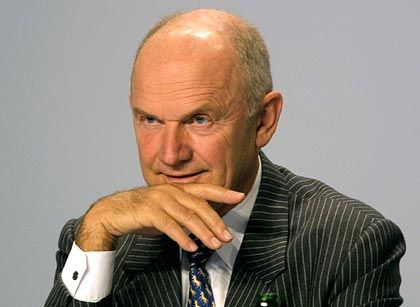Officially, they’re not under investigation. But a German prosecutor has asked a judge to extend a trial to allow him to question Volkswagen Chairman Ferdinand Piech and Audi boss Rupert Stadler about their knowledge of a bribery scheme involving VW officials and officials of the labor union representing VW workers.
The scheme surfaced several years ago, when Piech was VW president and Stadler was an aide to him. VW’s corporate structure give the union representation on the company’s board of directors. In that capacity, the company footed the bill for union board members to have luxury junkets, complete with the services of prostitutes. One VW official has been convicted of participation, receiving a two year suspended sentence and a fine of almost a million dollars. Trial of the union board member, is currently under way.
It is in the context of this trial that the German prosecutor has asked the court for permission to question Piech, Stadler, and another Piech aide about the extent and timing of their knowledge of the illegal payments. Piech has previously asserted that he knew nothing about it and that he asked Stadler to look into it when he did first learn about the scheme.
Piech, who is the grandson of Ferdinand Porsche, has largely been insulated from his management errors at VW by his family connection. Porsche holds a dominant shareholding in Volkswagen. Volkswagen has been unprofitable in United States operations and has stagnated in Europe, despite announced plans to increase global sales by 30% in the next three years. It was Piech who paid for Rolls-Royce, outbidding BMW, only to discover that he had not bought the rights to the Rolls-Royce name, a bungle that would have terminated the employment of most chief executive officers. He’s also the man who has poured billions into Bugatti, as Volkswagen’s market share has steadily declined. Piech was responsible for production of the New Beatle, but his efforts to move Volkswagen upmarket have been utterly disastrous, with the Phaeton costing the company billions and achieving sales of less than 2,500 vehicles in two years, after which it was withdrawn from the market. Of course, the same platform has been used for the Bentley Continental, and VW has made a success of Bentley, what is left of their ill-starred purchase of Rolls-Royce.
The decision of prosecutors to seek to question Piech, who is 70 years old, about the scandal is not good news for him or for Volkswagen, at least in the perspective of investors. It is believed that investigation of Piech at this juncture would be a major distraction for him and for the company. However, given Piech’s track record, it isn’t obvious that distracting him would be harmful to VW.
Piech’s claims of ignorance have always been somewhat hollow. The scheme operated at very high levels within the company, and required some careful execution to hide the expenses. If Piech did not know of it, the implication that he wasn’t paying very close attention is almost as unflattering. Nonetheless, Piech’s control over the company has not been affected by the scheme.
Volkswagen, as a company, has specifically stated that it did not audit the accounts used to hide the improper payments because it had no reason to believe that there had been any improper payments. So, in effect, VW has picked the incompetence theory, at least officially.
Nonetheless, the German prosecutor has specifically stated that the desire to question Piech and Stadler is to find out what Piech knew, or if he really was ignorant of the scheme. Were prosecutors convinced that Piech knew nothing, as he has claimed, they would have no reason to seek permission from the court to question him on precisely that topic.
Being questioned in court on the topic could put Piech in a bind, especially if his past statements about his knowledge have been less than candid.

